11 books about McCumber, John
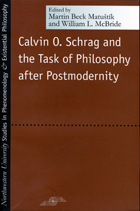
Calvin O. Schrag and the Task of Philosophy After Postmodernity
Martin Beck Matustik and William Leon McBride
Northwestern University Press, 2002
Devoted to the most important American Continental philosopher of his generation and one of the discipline's founding fathers, and featuring some of the field's
most distinguished luminaries, this collection is a critical document in Continental philosophy, reflecting its recent history, its present state, and its debt to Calvin O. Schrag. Taking up themes central to Schrag's own philosophical concerns, these essays refer throughout to his salient "interventions" in the dialogue of late-twentieth-century thought characterized as "postmodernity." The authors address, implicitly or directly, the question of philosophy's role and responsibility, or "task."
The volume begins with an overview of this task and of Schrag's contributions to it, written from the perspective of a resolute defender of the phenomenological tradition that Schrag's work has extended and reconfigured. The essays are organized around the four conceptual figures widely considered Schrag's most significant and original philosophical achievements: transversal rationality, the self after post-modernity, the fourth cultural value sphere, and communication praxis. Following and expanding on the implications of these themes, the authors focus on topics ranging from Cartesian rationality to Foucauldian rational relativism; from transcendence in relation to the self to the Schragean self's connections with discourse, action, and community; from religion's disruptive presence in contemporary philosophy to recent developments in the philosophy of language. The book also contains Schrag's responses to many of the works in the collection.
most distinguished luminaries, this collection is a critical document in Continental philosophy, reflecting its recent history, its present state, and its debt to Calvin O. Schrag. Taking up themes central to Schrag's own philosophical concerns, these essays refer throughout to his salient "interventions" in the dialogue of late-twentieth-century thought characterized as "postmodernity." The authors address, implicitly or directly, the question of philosophy's role and responsibility, or "task."
The volume begins with an overview of this task and of Schrag's contributions to it, written from the perspective of a resolute defender of the phenomenological tradition that Schrag's work has extended and reconfigured. The essays are organized around the four conceptual figures widely considered Schrag's most significant and original philosophical achievements: transversal rationality, the self after post-modernity, the fourth cultural value sphere, and communication praxis. Following and expanding on the implications of these themes, the authors focus on topics ranging from Cartesian rationality to Foucauldian rational relativism; from transcendence in relation to the self to the Schragean self's connections with discourse, action, and community; from religion's disruptive presence in contemporary philosophy to recent developments in the philosophy of language. The book also contains Schrag's responses to many of the works in the collection.
[more]
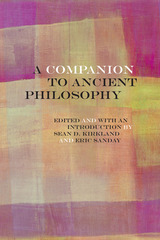
A Companion to Ancient Philosophy
Edited and with an introduction by Sean D. Kirkland and Eric Sanday
Northwestern University Press, 2018
A Companion to Ancient Philosophy is a collection of essays on a broad range of themes and figures spanning the entire period extending from the Pre-Socratics to Plato, Aristotle, and the Hellenistic thinkers.
Rather than offering synoptic and summary treatments of preestablished positions and themes, these essays engage with the ancient texts directly, focusing attention on concepts that emerge as urgent in the readings themselves and then clarifying those concepts interpretively. Indeed, this is a companion volume that takes a very serious and considered approach to its designated task—accompanying readers as they move through the most crucial passages of the infinitely rich and compelling texts of the ancients. Each essay provides a tutorial in close reading and careful interpretation.
Because it offers foundational treatments of the most important works of ancient philosophy and because it, precisely by doing so, arrives at numerous original interpretive insights and suggests new directions for research in ancient philosophy, this volume should be of great value both to students just starting off reading the ancients and to established scholars still fascinated by philosophy's deepest abiding questions.
Rather than offering synoptic and summary treatments of preestablished positions and themes, these essays engage with the ancient texts directly, focusing attention on concepts that emerge as urgent in the readings themselves and then clarifying those concepts interpretively. Indeed, this is a companion volume that takes a very serious and considered approach to its designated task—accompanying readers as they move through the most crucial passages of the infinitely rich and compelling texts of the ancients. Each essay provides a tutorial in close reading and careful interpretation.
Because it offers foundational treatments of the most important works of ancient philosophy and because it, precisely by doing so, arrives at numerous original interpretive insights and suggests new directions for research in ancient philosophy, this volume should be of great value both to students just starting off reading the ancients and to established scholars still fascinated by philosophy's deepest abiding questions.
[more]
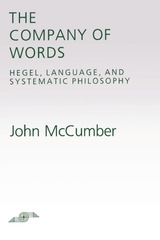
The Company of Words
Hegel, Language, and Systematic Philosophy
John McCumber
Northwestern University Press, 1993
In this provocative work, John McCumber asks us to understand Hegel's system as a new approach to linguistic communication. Hegel, he argues, is concerned with building community and mutual comprehension rather than with completing metaphysics or developing historical critique. According to McCumber's radial interpretation, Hegel constructs a complex ideal of how we should use certain words. This ideal philosophical vocabulary is flexible and open to revision, and is constructed according to principles available at all time and all places; it is responsive to, but not dictated by, the shared language of cultured discourse whose concepts it attempts to refine and universalize.
[more]
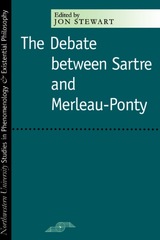
The Debate Between Sartre and Merleau-Ponty
Jon Stewart
Northwestern University Press, 1998
The Debate between Sartre and Merleau-Ponty provides a balanced portrait of the intellectual relationship between these two men. Essays by leading scholars as well as selections from the primary texts of Merleau-Ponty, Sartre, and Simone de Beauvoir address the numerous points of contact and cover the major themes of the debate from the different periods in their shared history. A biographical overview introduces the work and provides a context for the theoretical issues taken up in the articles, and an extensive bibliography suggests further readings to supplement the selections included in the volume.
[more]

Endings
Questions of Memory in Hegel and Heidegger
Edited by Rebecca Comay and John McCumber
Northwestern University Press, 1999
In this collection of essays, leading scholars provide a variety of models from which to view the unique relationship between the bodies of thought of Heidegger and Hegel, revealing how these philosophers offer ways of thinking historically that understand such thinking not merely as extensions and elaborations of a given paradigm but as actively engaged in the critical and transformative revisioning of the world.
Beginning at the point where Heidegger encountered Hegel, this volume of provocative essays addresses the respective philosophies of the two men. Leading scholars provide a variety of models from which to view the unique relationship between the bodies of thought of Heidegger and Hegel: bodies of thought that cannot be taken as two objects to be compared, contrasted, and finally evaluated but that must be viewed in dynamic terms, as a relationship in which self-transformations lead to mutual transformations and vice versa.
Beginning at the point where Heidegger encountered Hegel, this volume of provocative essays addresses the respective philosophies of the two men. Leading scholars provide a variety of models from which to view the unique relationship between the bodies of thought of Heidegger and Hegel: bodies of thought that cannot be taken as two objects to be compared, contrasted, and finally evaluated but that must be viewed in dynamic terms, as a relationship in which self-transformations lead to mutual transformations and vice versa.
[more]

The Ethics of History
John McCumber
Northwestern University Press, 2004
What is implied by "ethics of history"? The authors of this volume, internationally renowned philosophers and intellectual historians, address this question in all its novelty and ambiguity and develop varied perspectives on the place and nature of ethics in the philosophy, enterprise, and practice of history.
Is the whole historical process--largely consisting of the actions and sufferings of persons and groups--subject to ethical constraint? And what of the ways in which historians present their subject matter; are these methods subject to moral scrutiny? Although they approach these issues from different directions, the contributors agree in their critique of the correspondence theory of history, tin their acceptance of an unbridgeable gap between the past and the historian's present account, and in their call for a revision of the popular appeal to historical objectivity.
[more]
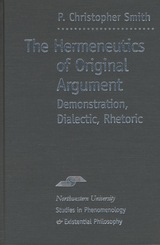
The Hermeneutics of Original Argument
Demonstration, Dialectic, Rhetoric
P. Christopher Smith
Northwestern University Press, 1998
What, precisely, does the word hermeneutics mean? And in what sense can one speak of the hermeneutics of original argument? In The Hermeneutics of Original Argument, P. Christopher Smith explores these questions in building upon Heidegger's hermeneutical thought. In applying Heidegger's basic notion that hermeneutics is not a doctrine of interpretation but is its actual execution, Christopher Smith penetrates the abstractions that conceal original argument and explores the structure and nature of argument as it originally occurs.
[more]
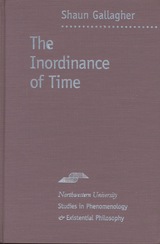
The Inordinance of Time
Shaun Gallagher
Northwestern University Press, 1998
The Inordinance of Time develops an account of the experience of time at the intersection of three approaches: phenomenology, cognitive science, and post-structuralism. Using insights developed in both the phenomenological and cognitive traditions Gallagher explores the inadequacies of the existing models, the limitations imposed by introspective reflection, concepts of intentionality and embodied existence, and the extra-intentional processes that govern the operations of consciousness and memory.
[more]
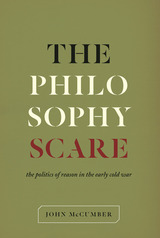
The Philosophy Scare
The Politics of Reason in the Early Cold War
John McCumber
University of Chicago Press, 2016
From the rise of formalist novels that championed the heroism of the individual to the proliferation of abstract art as a counter to socialist realism, the years of the Cold War had a profound impact on American intellectual life. As John McCumber shows in this fascinating account, philosophy, too, was hit hard by the Red Scare. Detailing the immense political pressures that reshaped philosophy departments in midcentury America, he shows just how radically politics can alter the course of intellectual history.
McCumber begins with the story of Max Otto, whose appointment to the UCLA Philosophy Department in 1947 was met with widespread protest charging him as an atheist. Drawing on Otto’s case, McCumber details the hugely successful conservative efforts that, by 1960, had all but banished the existentialist and pragmatist paradigms—not to mention Marxism—from philosophy departments all across the country, replacing them with an approach that valorized scientific objectivity and free markets and which downplayed the anti-theistic implications of modern thought. As he shows, while there have since been many instances of definitive and even explosive rejection of this conservative trend, its effects can still be seen at American universities today.
McCumber begins with the story of Max Otto, whose appointment to the UCLA Philosophy Department in 1947 was met with widespread protest charging him as an atheist. Drawing on Otto’s case, McCumber details the hugely successful conservative efforts that, by 1960, had all but banished the existentialist and pragmatist paradigms—not to mention Marxism—from philosophy departments all across the country, replacing them with an approach that valorized scientific objectivity and free markets and which downplayed the anti-theistic implications of modern thought. As he shows, while there have since been many instances of definitive and even explosive rejection of this conservative trend, its effects can still be seen at American universities today.
[more]
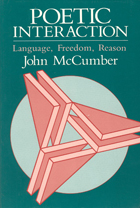
Poetic Interaction
Language, Freedom, Reason
John McCumber
University of Chicago Press, 1989
Poetic Interaction presents an original approach to the history of philosophy in order to elaborate a fresh theory that accounts for the place freedom in the Western philosophical tradition. In his thorough analysis of the aesthetic theories of Hegel, Heidegger, and Kant, John McCumber shows that the interactionist perspective recently put forth by Jürgen Habermas was in fact already present in some form in the German Enlightenment and in Heidegger's hermeneutic phenomenology. McCumber's historical placement of the interactionist perspective runs counter to both Habermas's own views and to those of scholars who would locate the origin of these developments in American pragmatism. From the metaphysical approaches of Plato and Aristotle to the interactionist approaches of Habermas and Albrecht Wellmer, McCumber provides an original narrative of the history of philosophy that focuses on the ways that each thinker has formulated the relationships between language, truth, and freedom. Finally, McCumber presents his critical demarcation of various forms of freedom to reveal that the interactionist approach has to be expanded and enlarged to include all that is understood by "poetic interaction." For McCumber, freedom is inherently pluralistic. Poetic Interaction will be invaluable to political philosophers, historians of philosophy, philosophers of language, and scholars of legal criticism.
[more]
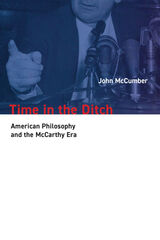
Time in the Ditch
American Philosophy and the McCarthy Era
John McCumber
Northwestern University Press, 2023
In Time in the Ditch, John McCumber explores the effects of McCarthyism on American philosophy in the 1940s and 1950 and the possibility that the political pressures of the McCarthy era skewed the development of the discipline. Why was silence maintained for so long? And what happens, McCumber asks, when political events and pressures go beyond interfering with individual careers to influence the nature of a discipline itself?
[more]
READERS
Browse our collection.
PUBLISHERS
See BiblioVault's publisher services.
STUDENT SERVICES
Files for college accessibility offices.
UChicago Accessibility Resources
home | accessibility | search | about | contact us
BiblioVault ® 2001 - 2024
The University of Chicago Press









